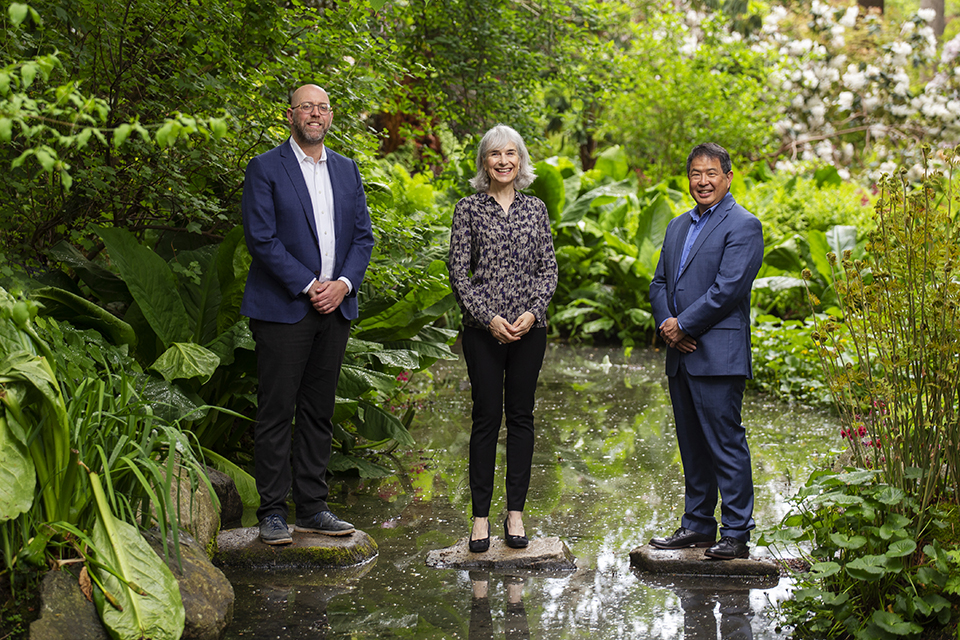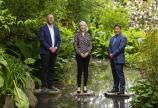Humanities research goes global with $5M from federal funding agency
Social Sciences, Peter B. Gustavson School of Business, Fine Arts, Education, Humanities, Human and Social Development

Two humanities-based projects that put past injustices at the forefront of public conversations about equitable futures—one leading the co-creation of graphic novels by accomplished artists and survivors of mass atrocities and genocides, the other illuminating the mistreatment of people of Japanese descent in allied countries during and after the Second World War—received $5 million in federal government support to create new global connections and partnerships.
These two grants are part of the $6.6 million announced that is going to UVic researchers and students in the Faculties of Humanities, Education, Social Sciences, Fine Arts, Human and Social Development, as well as the Gustavson School of Business.
The Faculty of Humanities is the only faculty this year at UVic to receive Social Sciences and Humanities Research Council (SSHRC) partnership grants in the 2021-22 award competition.
I am delighted to congratulate all recipients of the SSHRC awards and grants. We are particularly proud to announce the continuation of two distinctly different projects that bring multiple community partners together with our students and researchers. They’ll address some of the most pressing societal questions about the enduring scourge of racism, the lessons that humanity continues to learn and where the world will go from here.
—Lisa Kalynchuk, UVic’s vice-president, research and innovation
Visual Storytelling and Graphic Art
The project on Visual Storytelling and Graphic Art in Genocide and Human Rights Education, co-directed by Holocaust historian Charlotte Schallié, chair of UVic’s Department of Germanic and Slavic Studies, and University of British Columbia educator Andrea Webb, builds on an innovative approach to recording and commemorating the experiences of genocide and mass atrocity survivors through the co-creation of graphic novels based on survivors’ experiences. With partners in 16 countries, the initiative connects 11 survivors of the Holocaust and mass atrocities committed in Rwanda, Bosnia, Kosovo, Iraq, Syria and Canada with a team of 52 scholars, 13 artists and practitioners from 36 museums, schools and human rights groups.
Over the next seven years, this international team will produce documentary films, museum exhibitions, gallery installations, youth-appropriate educational materials and graphic novels that will reach audiences around the world and help teach a new generation about mass-atrocities, large-scale traumas and human rights. This approach to testimony collection and dissemination builds on the foundation of Schallié’s earlier project of a similar name—the Narrative Art and Visual Storytelling in Holocaust in Human Rights Education—which paired four Holocaust survivors with three artists to create the beautifully rendered collection But I Live: Three Stories of Child Survivors of the Holocaust, which was published in North America last month. Funding to expand this dynamic project globally includes $2.5 million from SSHRC and an additional $2.4 million in cash and in-kind contributions from partner organizations.
Past Wrongs, Future Choices
The Past Wrongs, Future Choices (PWFC) project, led by its co-directors, UVic historian Jordan Stanger-Ross and Queens University geographer Audrey Kobayashi, along with project manager Michael Abe, will be the first ever to connect and make public records from across the globe about the mid-20th century internment, dispossession and displacement of people of Japanese descent (Nikkei) in allied countries through the Americas and the Pacific. Hosted by UVic’s Centre for Asia Pacific Initiatives and Centre for Global Studies, the PWFC network includes a team of 80 researchers, teachers, archivists, librarians and museum curators on five continents, and connects 40 partnering institutions in Canada, Brazil, Australia, Japan and the United States. Together, the group will develop four coordinated, multinational museum exhibitions, a digital archive and educational resources as well as three books and a four-part documentary series. The goal is to prompt societies where racialized injustice continues to occur within and across national borders to confront the lessons of history and grapple with the question of what we owe one another, especially in times of crisis.
The project builds upon and significantly expands the highly successful, seven-year Landscapes of Injustice project, which explored the dispossession and displacement of Japanese Canadians in the 1940s and 1950s, and which was the largest public research and history project in Canada at the time. Funding to expand this project globally includes $2.5 million from SSHRC and an additional $3.3 million in cash and in-kind contributions from project partners.
These two community-based interdisciplinary projects showcase the critical role of humanities research in tackling the world’s most pressing social injustices. We are grateful to the Social Sciences and Humanities Research Council for their investment in the international partnerships required to meet these global challenges.
—Annalee Lepp, dean of UVic's Faculty of Humanities
The remaining SSHRC-funded research projects at UVic range from an exploration of the spiritual aspects of yoga to a gender, race and diversity initiative—all of which echo the university’s commitment to the pursuit of the United Nation’s Sustainability Development Goals, specifically those of health, well-being, peace and justice. Recent university rankings placed UVic 12th among the world’s top institutions in this pursuit and the university is also ranked by Times Higher Education as among the world’s top 300 schools in the arts and humanities.
Learn more
- Q&A with Schallié
- Q&A with Bramadat
- Q&A with Stanger-Ross and Abe
- Research & Innovation at UVic
- Info about UVic & international
-- 30 --
Photos
Media contacts
Philip Cox (Humanities Communications) at 250-857-1061 or humscomm@uvic.ca
Denise Helm (University Communications + Marketing) at 250-721-7656 or dhelm@uvic.ca

